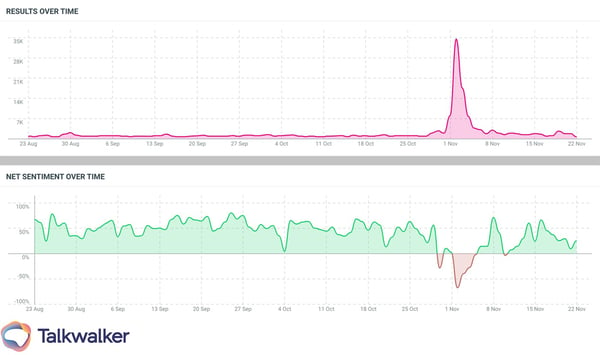Businesses navigate a tough landscape rife with risks and opportunities. The online space is the most diverse environment for brands to sell in, but it’s also a highly volatile and open place where consumers and customers hold a disproportionate amount of influence and power on how they talk about, review and raise brand issues.
In this blog, we look at why crisis management is essential and demonstrate how social listening can help. Read on to learn more.
What is crisis management?
Crisis management is the process of safeguarding your reputation, assets, and stakeholders. It involves risk assessment, preparation, response, and recovery. You can learn more about the steps and strategies you need in our what is crisis management blog.
Preserve Reputation
Preserving your brand or business reputation is essential in crisis management. Your brand represents your image, trust, and relationship with consumers, making it an invaluable asset that demands protection. The effective handling of crisis situations is crucial to prevent reputational damage and maintain public trust.
A crisis management plan enables you to share the steps taken to address an issue and minimize its impact. By demonstrating transparency, and a commitment to resolving situations as they arise, you can take steps to help safeguard your reputation. With the right approach, your organization can successfully navigate any crisis.
How social listening can help
Time is crucial for effective reputation management. By consistently monitoring your brand, you can quickly identify potential crises and discover hidden issues.
Taking proactive steps to address these concerns reduces risks and can boost your brand perception and credibility in the long term. It can also help you proactively improve customer service.

A large spike in mentions alongside a drop in brand sentiment is a sign of a potential crisis.
Prevent Escalation
Crisis management helps prevent the escalation of crises into more severe situations. By identifying triggers, risks, and weaknesses, you can promptly assess and contain situations before they spiral out of control.
Integrating crisis management into your organization's culture and operations ensures preparedness when addressing unexpected events. This proactive approach prevents minor issues from snowballing into a full-blown crisis.
How social listening can help
By listening to conversations across a wide range of sources you can identify potential ignition points. These should include news, social media, blogs, and more. Headlines or engagement from major influencers can quickly escalate an issue. Identifying these conversations will help you engage in the story faster with targeted responses.
Minimize Damage
Crisis management serves a critical purpose: minimizing the impact of a crisis. By responding effectively, you can coordinate resources, personnel, and strategies to mitigate financial, operational, and reputational damage.
Crises can directly impact product sales, both online and in-store. By addressing issues promptly, you can limit the spread of negative effects and safeguard your bottom line.
How social listening can help
Sentiment analysis is a key benefit of social listening. By analyzing the sentiment of conversations over time, you can benchmark your brand position.
Drops in net sentiment can help identify any potential areas of brand damage. While key sentiment drivers can uncover the negative conversations. With this insight, you are then in a position to lead timely and targeted response.
Ensure Business Continuity
One crucial aspect of crisis management is ensuring your business operations throughout and post-crisis. This includes the development of comprehensive recovery plans, risk assessments, and business continuity strategies.
By addressing potential risks, you can significantly enhance your preparedness for crises, and minimize downtime. This proactive approach safeguards revenue streams, protects employee livelihoods, and ensures customer satisfaction. Seeing a crisis as an opportunity, not just a problem to be solved, can lead to both fast brand recovery but also a direct increase in consumer trust.
How social listening can help
Understanding conversations around your brand over time can help ensure business continuity. By looking at the key brand conversations, you can identify where your crisis communications are having the most impact. And find new opportunities for brand growth.
Protect Stakeholders
Crisis management plays a vital role in safeguarding the well-being of your employees, customers, and community. A well-crafted crisis response plan prioritizes the safety and interests of everyone connected to your business.
With a strong and ethical crisis response, you can fulfill your social contract with consumers. This will help foster trust and loyalty in the long run.
How social listening can help
Understanding your consumers at a local level can boost safeguarding. By understanding conversations around a region, or even a store, you can identify localized risks. This will enable a targeted response to engage that specific community.
Demonstrate Responsibility
Effective crisis management plays a crucial role in showcasing your responsibility and accountability. It helps you quickly acknowledge issues, take decisive actions, and transparently communicate plans for resolution. This will demonstrate your commitment to upholding ethical standards and responsible corporate behavior.
As expectations for corporate responsibility are on the rise, being accountable, responsive, and reliable will give you a competitive edge.
How social listening can help
Trend analysis can help identify how consumer opinions around key topics like sustainability are evolving. By engaging these conversations, and aligning your brand to match expectations, you’ll connect more with consumers.
Conclusion
Crisis management is vital for safeguarding businesses and their stakeholders in today's economy. By strategically navigating and mitigating crisis risks, you can confidently thrive and build resilience in an ever-changing world.
To learn more about crisis management, and how Talkwalker’s next-generation social listening can help you, click below.